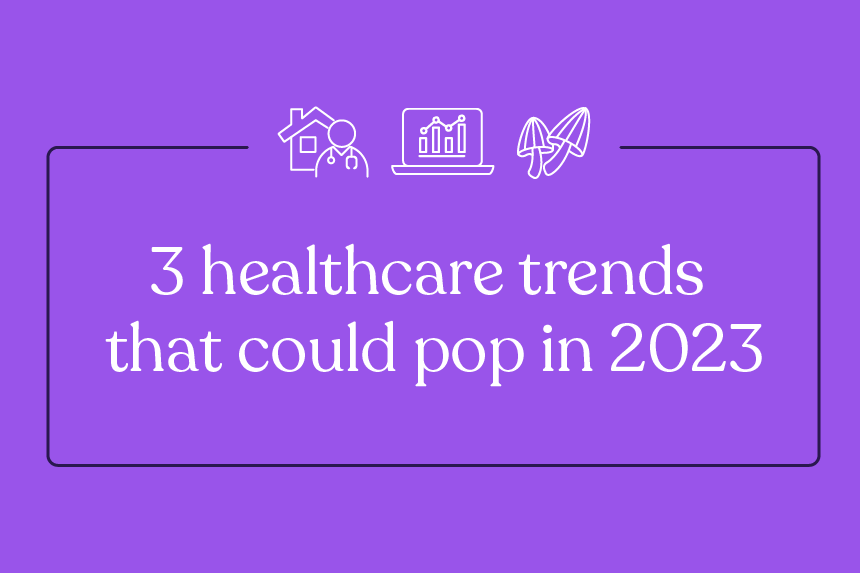The world is a very different place today than it was a year ago. Beyond all of us being a little bit older, and perhaps having some gray hairs to show for it, probably no industry has changed as much as healthcare has in the last 12 months.
In 2022, we continued to see the lasting effects of COVID-19 as outpatient care outside hospitals surged, and physicians burned out, while both costs and M&A activity increased. Meanwhile, the remote patient monitoring renaissance continued, and hospitals invested heavily in genetic testing tools and precision medicine to improve diagnoses and treatment plans.
It was a hectic year, to say the least, but one that fills me with optimism for the future. And if you’re like me, wondering what’s in store for 2023, then this two-part blog series might help you discover new opportunities in the markets you operate in.
I sat down with people across Definitive Healthcare to learn what major healthcare issues and trends they’re watching this year. After speaking with dozens of colleagues, these three trends bubbled to the top of my list of things that I’ll watch out for in 2023:
- Will 2023 be the year for at-home care?
- Biopharma marketing can learn from patient-centered care
- A new era of psychedelic medicine is on the horizon
Will 2023 be the year for at-home care?
I first sat down with Senior Product Marketing Manager Kevin Dubuc, who shared his thoughts on the evolution of the at-home care space over the years.
The home healthcare market has been growing in popularity and profitability for years. According to the National Library of Medicine, about five million people received care at home in 2019. As COVID-19 spread and people were reluctant to visit their doctors face-to-face, this number dramatically increased to 15 million by the end of 2021.
This growing market was ripe for opportunity— and 2022 was a year of enormous investment in at-home care. In March, UnitedHealth Group announced its plans to acquire the home healthcare giant LHC Group for about $5 billion. Later in September, CVS Health also announced its plans to acquire Signify Health, which could help CVS enhance its connection to its consumers in the home and better address their needs. Both acquisitions are expected to close in the first half of 2023.
In addition to the above, Kevin and I are both following the journey of Medically Home, an organization that helps hospitals and health systems provide acute care services in patients’ homes. Medically Home’s software aims to create a ‘virtual hospital’ by connecting patients and their electronic health records (EHR) with a complex network of resources from labs and pharmacies to nurses and meal providers.
The increased M&A activity and the promise of Medically Home paint a fascinating future for at-home healthcare, but Kevin pointed out that the road ahead could be bumpy. The ongoing staffing shortage continued into 2022 and put a spotlight on many of the issues home healthcare workers face: low wages, high turnover, burnout, and limited opportunities for career advancement. Like so many thousands of physicians, home healthcare workers are transitioning into new roles or are leaving the workforce completely. Companies like CVS and UnitedHealth (and home health agencies too) may face challenges growing in the home healthcare market throughout 2023.
The upside? President Biden signed the Consolidated Appropriations Act 2023 into law, which includes several healthcare provisions. Mainly, support for the Acute Hospital Care at Home program has been expanded for another two years, allowing hospitals to continue to provide care in a home setting and get reimbursed normally. Companies investing in the space should have more time to build more sustainable business models.
Biopharma marketing can learn from patient-centered care
Today, there are many healthcare providers who have adopted a patient-centered approach to care. And when I spoke with Senior Product Marketing Manager Michael Muskus, he explained how biopharma companies can learn from the principles of patient-centered care to be more successful in their market.
In patient-centered care, the patient is empowered to become an active participant in their own care. Providers treat patients not only from a clinical perspective, but also from an emotional, mental, social, spiritual, and financial perspective.
The American Psychological Association (APA) argues that the practice of patient-centered care is easier to describe than it is to execute. Patient-centered care requires providers to challenge decades of conventional wisdom promoting a paternalistic model of care. To be patient-centric, providers need to rethink their relationships with patients, and the relationships patients have with healthcare.
Michael believes biopharma marketing teams must put themselves in the shoes of their patients. By genuinely listening to their reasons, motives, and fears, biopharma marketers can build long-lasting, positive relationships with their customers and grow patient market share at the same time.
Michael offers two pieces of advice for biopharma marketers:
It’s vital to understand that modern patients are more intimately involved in the clinical decision-making process of their care. To meet patients at their level, companies should craft messaging and create content that is culturally relevant, easy to understand, and above all, offers value.
Social media has fundamentally changed the way consumers interact with a brand. Patients use Facebook, Twitter, and Reddit to share their experiences with medication or to spread awareness about health symptoms. Take advantage of this marketing opportunity to learn their language, understand their concerns, and adapt accordingly.
Michael cited Novartis as a good example to learn from. In a recent statement to patients and caregivers, the company outlined its commitment to “actively seek out and listen to insights from the patient community throughout the development and commercialization process for our medicines.” The article also detailed Novartis’ dedication to making the results of clinical trials—positive or negative—transparent and easily accessible.
A new era of psychedelic medicine is on the horizon
Let’s bring part one of this blog to a close with a far-out idea from Senior Content Writer Nicole Witowski. A new era of psychedelic medicine may emerge in 2023, and she believes the possibilities are opening people’s minds to new ways to treat psychiatric disorders and mental health conditions.
Psychedelic drugs are a class of substances that can induce altered thoughts and affect one’s mood and senses. At high enough doses, psychedelics can cause visual hallucinations. Psilocybin, the active ingredient in magic mushrooms, is one such drug the nation’s brain scientists are getting excited about.
In November 2022, the Society for Neuroscience held its annual symposium in San Diego. Hundreds of neurologists, biomedical engineers, and healthcare researchers gathered to share their work on how psychedelic substances like psilocybin can help rewrite the brain, forging new connections between neurons that boost neural plasticity. Research suggests psilocybin can help patients recover from brain injury or stroke and manage anxiety, depression, PTSD, and other mental health conditions.
An August 2022 study on alcohol-use disorder found that two doses of psilocybin combined with psychotherapy led to an 83% decline in heavy drinking among participants. By the end of the eight-month trial, nearly half of them had stopped drinking entirely.
However, the research and long-term benefits of treating mental health conditions with psychedelic drugs are still in its infancy. Psychotherapy using MDMA (ecstasy) is currently in phase 3 clinical trials with patients with PTSD and is likely to be FDA approved by the end of 2023. Psilocybin is undergoing phase 2 clinical trials for major depressive disorder (MDD).
But we might not need to wait too long to see more results of psychedelic medicine. On January 1, 2023, Oregon became the first state to legalize the adult use of psilocybin. The state’s decision has encouraged legislators in Colorado, New York, Washington, and a dozen other states to decriminalize certain psychedelics.
If the results of the clinical trials are favorable, then psychedelic medicine could be a major boon in the fight to destigmatize mental healthcare. Check out episode seven of the Definitively Speaking podcast: Rethinking mental health with Cara McNulty of CVS Health for more on how healthcare organizations are working to democratize access to mental healthcare.
Learn more
The year has only just begun, and there are plenty more healthcare predictions to make. Keep your eyes peeled for the second part of this blog series, where we’ll dig into three more trends that have got me excited. I’ll keep them a secret for now—just to get you to read next time!
In the meantime, make sure you have the healthcare commercial intelligence you need to reach your 2023 goals. Sign up for a free trial of the Definitive Healthcare platform today to get industry-leading insights across the healthcare landscape.


